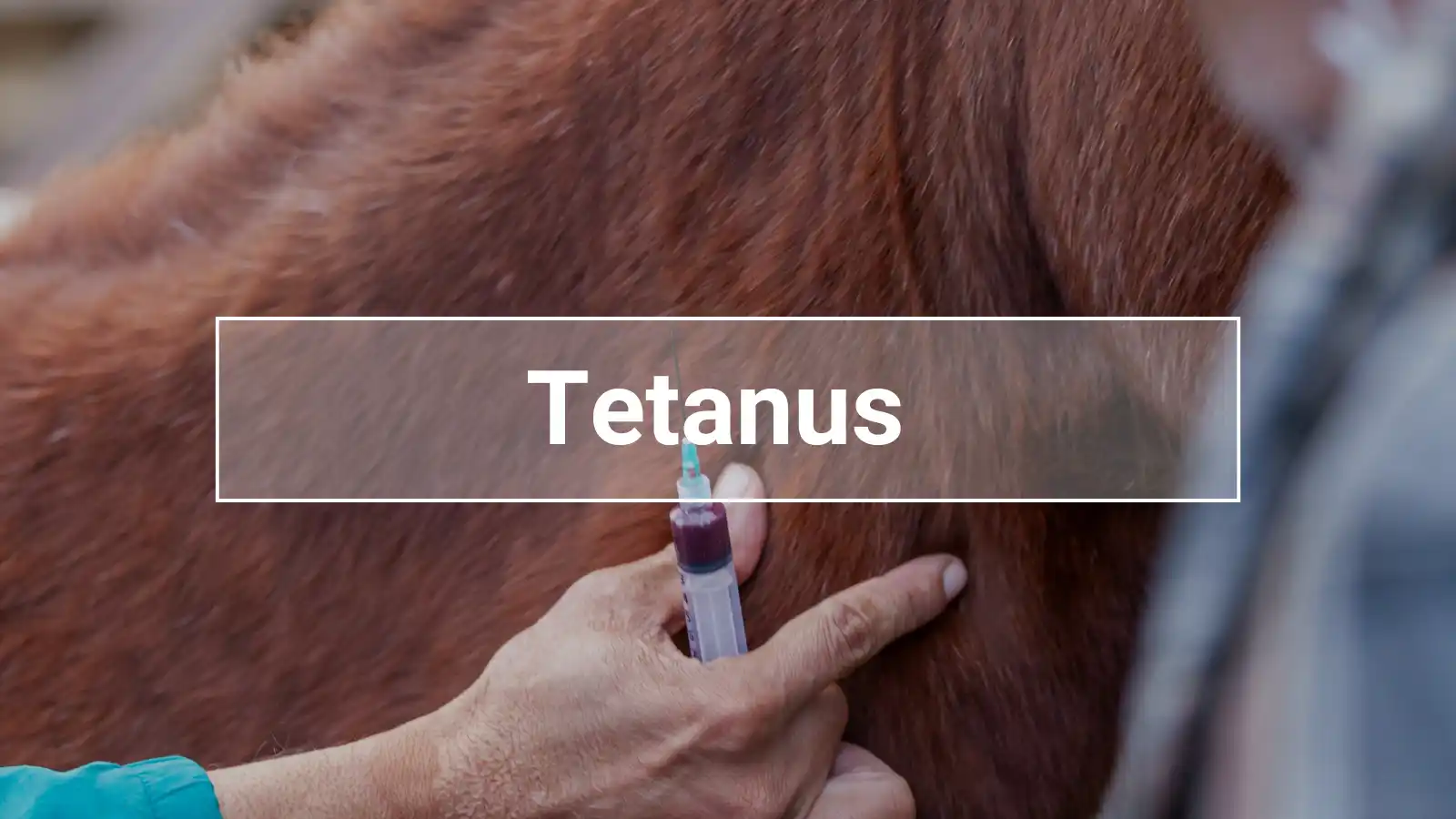
Tetanus in Horses: Symptoms, Vaccination, and the Cost of the Combined Influenza–Tetanus Vaccine
Tetanus in horses is one of the most dangerous equine diseases, caused by the bacterium Clostridium tetani. Even the smallest wounds can allow infection, leading to rapid progression and, in most cases, death. Because treatment is rarely successful, vaccination is the only reliable protection. In this article, we explain the symptoms, causes, and vaccination schedule — including the benefits and costs of the combined influenza–tetanus vaccine.
Table of Contents
What Is Tetanus in Horses?
Equine tetanus is a severe infectious disease caused by the bacterium Clostridium tetani. These bacteria are widespread in the environment, especially in soil, manure, and on pastures. If they enter the horse’s body through an open wound, they produce a powerful neurotoxin (tetanospasmin) that attacks the central nervous system.
Tetanus in horses is almost always fatal, as symptoms progress quickly and effective treatment often comes too late. It is considered an emergency — but thankfully, it can be reliably prevented through vaccination.
Causes: How Does Tetanus Develop in Horses?
Horses are particularly vulnerable to tetanus. Even minor injuries — such as a scratch on the heel bulb or an abrasion on the chest — can allow the bacteria to enter. Common entry points include:
- Cuts and puncture wounds
- Skin conditions such as mud fever or open sores
- Injuries caused by dirty equipment
- After foaling in mares or via umbilical infections in foals
If wounds are not cleaned and disinfected properly, Clostridia can spread rapidly.
Symptoms of Tetanus in Horses
Symptoms typically appear 3 to 21 days after infection. Typical signs include:
- Stiffness of the jaw muscles (“sawhorse stance”)
- Elevated tail
- Protrusion of the third eyelid
- Difficulty chewing and swallowing
- Excessive salivation
- Muscle tremors
- Nervousness and hypersensitivity
- Stiff or uncoordinated gait
As the disease progresses, horses often develop severe spasms, respiratory failure, and eventually death. Without treatment, more than 80% of affected horses die within a few days.
Vaccination: How Often Should Horses Be Vaccinated Against Tetanus?
The tetanus vaccine is one of the most essential equine vaccinations. It is part of every foal’s basic immunization and must be maintained for life.
Vaccination schedule according to STIKO Vet:
- Basic immunization:
- First vaccination at 6 months of age (as early as 8 weeks in high-risk cases)
- Second vaccination after 4–6 weeks
- Third vaccination 12 months later
- Booster shots: every 2 years
- Emergency treatment: Passive immunization with tetanus antitoxin for unvaccinated injured horses
Note: In many stables, vaccination is carried out annually when combined with influenza vaccines.
Combined Tetanus–Influenza Vaccination
Many veterinarians recommend the combined tetanus–influenza vaccination, as it protects against two serious diseases in one injection. Benefits include:
- Only one injection required
- More cost-effective than two separate vaccines
- Less stressful for the horse
- Reduced organizational effort for owners
Frequency:
Because influenza requires annual boosters, the combined vaccine is typically administered once a year. This also ensures continuous tetanus protection, even though tetanus immunity alone would last two years.
What Does a Tetanus Vaccination Cost?
Costs vary depending on the region, veterinary practice, and vaccine type:
- Tetanus only: €25–45
- Combined tetanus–influenza: approx. €40–70
Tip: Many veterinarians offer group vaccination days in barns, reducing costs for travel and examination.
Why Is Regular Tetanus Vaccination So Important?
Unlike influenza or herpes, tetanus is not contagious. Instead, it lurks invisibly in the environment. Horses contract it not from other animals, but through everyday minor wounds.
Because the disease is almost always fatal and not truly treatable, the only reliable protection is vaccination. It protects not only the horse but also the owner from high veterinary costs, suffering, and difficult decisions.
Can Tetanus Be Treated in Horses?
If detected early, intensive veterinary care — including antitoxin, antibiotics, and symptomatic treatment — can be attempted. However, the chances of recovery are extremely low, and treatment is costly, stressful, and rarely successful. Prevention remains the only effective strategy.
Special Case: Foals
Foals receive antibodies through the colostrum of the dam, provided the mare was vaccinated in time. This maternal immunity protects the foal for the first months of life.
Basic immunization starts:
- From the 6th month of life
- In case of injuries: immediate passive immunization with antitoxin
STIKO Vet Recommendation
The Ständige Impfkommission Veterinärmedizin (STIKO Vet) classifies the tetanus vaccination as a mandatory core vaccine for all horses in Germany. The high environmental presence of Clostridia and the extreme risk of death make regular vaccination essential.
Conclusion: Tetanus Vaccination Saves Lives
Tetanus is a deadly disease that cannot be prevented by hygiene measures alone. Once a horse has even a small wound, infection is possible. The only reliable protection is a consistent vaccination schedule.
The combined tetanus–influenza vaccination is efficient, cost-effective, and ensures double protection. Consult your veterinarian to set up a complete and reliable vaccination plan for your horse.
FAQ – Tetanus Vaccination in Horses
How often should horses be vaccinated against tetanus?
Every 2 years. With combined influenza vaccination, usually annually.
How much does a tetanus vaccination cost?
€25–45 for a single vaccination; €40–70 for the combined vaccine.
How long does tetanus vaccination last in horses?
At least 2 years, but with the annual flu–tetanus combination, protection is continuous.
What are the symptoms of tetanus in horses?
Muscle stiffness, difficulty swallowing, elevated tail, spasms, immobility.
Is tetanus in horses curable?
In most cases, unfortunately not — the disease is usually fatal.

